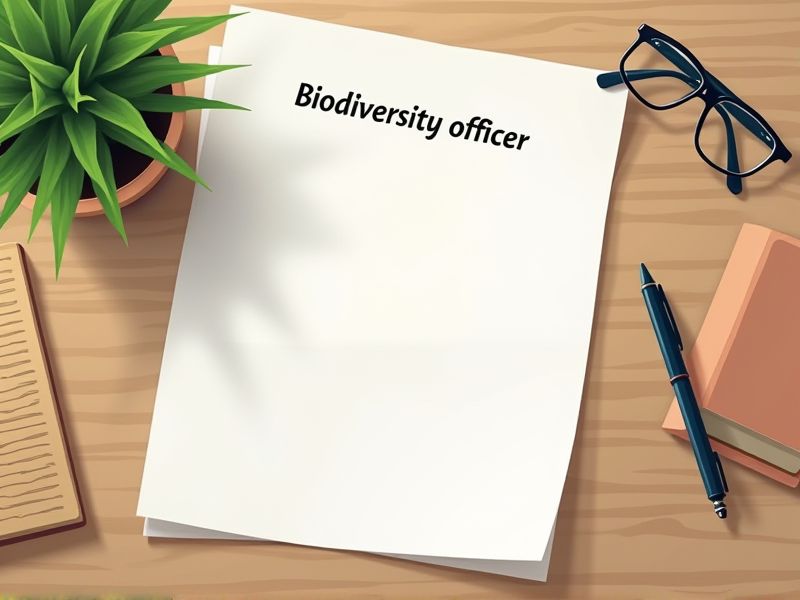
Biodiversity officers play a crucial role in preserving natural ecosystems, requiring specialized knowledge to effectively manage and protect various species and habitats. Certifications provide validation of a professional's expertise, ensuring that biodiversity officers possess the essential skills and understanding necessary for effective conservation efforts. Given the complexity of ecosystems and the challenges of biodiversity loss, these certifications ensure officers are equipped with updated best practices and regulatory knowledge. Critical certifications are essential for driving impactful conservation initiatives as a Biodiversity officer.
Certified Wildlife Biologist (CWB)
A Certified Wildlife Biologist possesses specialized expertise in ecology, essential for assessing and managing biodiversity within ecosystems. This knowledge enables biodiversity officers to implement effective conservation strategies, crucial in the face of habitat and species decline. CWB professionals provide data-driven insights, guiding sustainable land-use and development decisions that impact regional biodiversity. Their qualifications ensure that biodiversity policies are based on scientific evidence, increasing the likelihood of successful conservation outcomes.
Certified Ecological Restoration Practitioner (CERP)
The role of a Certified Ecological Restoration Practitioner (CERP) ensures that a biodiversity officer possesses validated expertise in ecosystem restoration techniques. A biodiversity officer with CERP accreditation applies scientifically-backed methods to restore and preserve habitats, enhancing the richness of local biodiversity. With proper training, a CERP-certified officer effectively addresses ecosystem challenges, ensuring sustainable practices that align with conservation goals. This certification enhances credibility and supports collaborative efforts in environmental management and policy development.
Certified Environmental Professional (CEP)
The Certified Environmental Professional (CEP) credential equips a Biodiversity Officer with advanced knowledge and skills to manage and protect ecosystems effectively. Holding a CEP certification signals to employers and stakeholders that the officer is proficient in identifying and mitigating environmental impacts on biodiversity. This credential often results in better compliance with environmental regulations and policies, ensuring sustainable practices are followed. Certified professionals are generally more adept at integrating scientific data with conservation strategies, which is crucial in preserving biodiversity.
ISO 14001 Environmental Management Systems Lead Auditor
A Biodiversity Officer benefits from ISO 14001 Environmental Management Systems Lead Auditor training as it enhances their ability to assess and manage the environmental impact of projects, ensuring compliance with international standards. This training equips them with skills to systematically evaluate environmental performance and implement improvements, which can directly lead to better protection of biodiversity. Informed auditing practices help identify potential risks and mitigative strategies, promoting sustainable development within biodiversity projects. As a result, organizations can improve their environmental credibility and stakeholder confidence.
GIS and Remote Sensing Certification
A GIS and Remote Sensing Certification equips a biodiversity officer with skills to analyze spatial data for effective environmental monitoring. The certification enhances the ability to track changes in ecosystems, contributing to more informed conservation strategies. Proficiency in these technologies allows for accurate mapping of species distributions, aiding in biodiversity assessments. Trained officers can also swiftly identify areas of habitat degradation, facilitating timely interventions to protect threatened ecosystems.
LEED Green Associate
The LEED Green Associate credential provides foundational knowledge in sustainable building principles, which can enhance a Biodiversity Officer's understanding of eco-friendly construction impacts on ecosystems. A Biodiversity Officer with this credential is better equipped to assess how development projects might affect local habitats and species, ensuring more informed ecological decisions. LEED principles support practices that minimize environmental disruption, aligning with biodiversity goals of preserving natural resources. This credential signifies a commitment to sustainability that can bolster a Biodiversity Officer's credibility in promoting green initiatives within development projects.
Environmental Impact Assessment (EIA) Certification
EIA Certification equips a Biodiversity Officer with the skills to assess potential impacts of development projects on ecosystems. Understanding these impacts allows them to formulate strategies that mitigate harm to wildlife and plant species. With proper assessments, they ensure legal compliance with environmental regulations which prevents biodiversity loss. This certification enables informed decision-making that balances developmental needs with ecological preservation.
Conservation Biology Certification
Conservation Biology Certification equips a biodiversity officer with specialized knowledge and skills to effectively address environmental challenges. It ensures these professionals understand the complexities of ecological systems and biodiversity management. Certification validates their ability to implement scientifically-backed conservation strategies. Enhanced credibility through certification can lead to more successful collaborations with government bodies and conservation organizations.
Sustainable Ecosystem Management Certification
Sustainable Ecosystem Management Certification equips Biodiversity Officers with specialized knowledge to implement effective conservation strategies. This certification fosters credibility and ensures adherence to global environmental standards and best practices. A certification validates the officer's ability to balance environmental, economic, and social factors in ecosystem management. It encourages collaboration among stakeholders, which is crucial in addressing complex biodiversity challenges.
Biodiversity Conservation and Climate Adaptation Certification
Biodiversity Conservation and Climate Adaptation Certification equips biodiversity officers with the specialized knowledge needed to address the complex interplay between ecosystems and climate change. Certified officers can implement evidence-based strategies to mitigate biodiversity loss, enhancing ecological resilience. As climate change accelerates, regional ecosystems face increased vulnerabilities, necessitating trained professionals to develop adaptive management plans. The certification enhances credibility and stakeholder trust, crucial for securing support and funding for conservation initiatives.
Summary
You gain enhanced credibility and professional recognition when a Biodiversity Officer obtains certifications. This leads to increased trust from employers and stakeholders in biodiversity projects. Organizations you work with tend to achieve better conservation outcomes due to your updated skills and knowledge. Career advancement opportunities become more accessible as your certified expertise aligns with current environmental standards.
